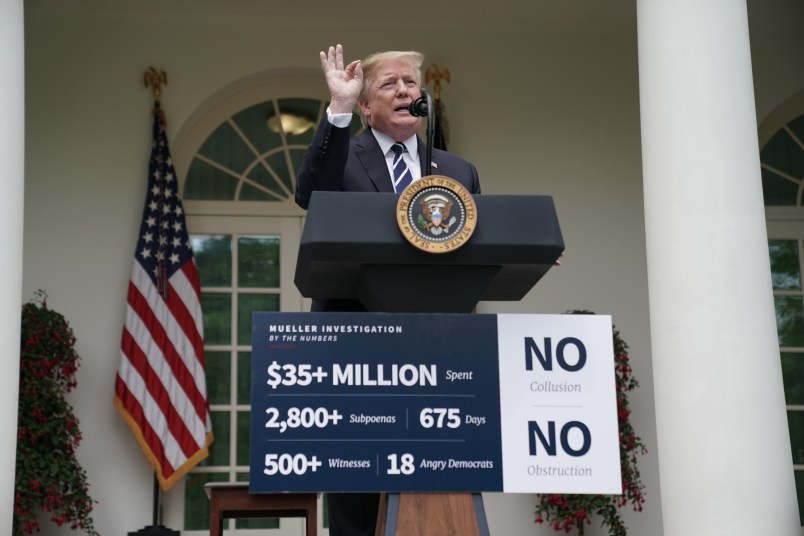A lawyer for the House of Representatives told an appeals court Monday that among the issues the House is probing in its ongoing impeachment inquiry is whether President Trump lied to special counsel Robert Mueller’s investigation.
The comments came in a hearing over whether the Judiciary Committee can access certain grand jury materials from Mueller’s probe. A district court judge already okayed their release, but now the the Justice Department is asking the appeals court to put that judge’s ruling on pause while it considers the case on the merits.
Much of Tuesday’s hour-and-a-half-long hearing focused on whether the House had met its standard of showing a particularized need for the sought materials.
House General Counsel Doug Letter said that the materials could answer the question: “Was the President not truthful in his responses to the special counsel.”
Letter was asked by Judge Thomas Griffith what the Mueller grand jury materials have to do with the Ukraine-focused impeachment proceedings currently happening on Capitol Hill.
“Don’t believe everything you read,” Letter said, referring to media reports that describe those impeachment proceedings as being separate from the Mueller-related inquiry.
Letter said that the House impeachment probe is “in part” about Ukraine, but that it is also looking at whether Trump obstructed the Mueller investigation and the question of, “What did he know about Wikileaks.”
The first volume of the Mueller report refers to the grand jury testimony of former Trump campaign advisor Paul Manafort, Letter said. An issue for the House is whether that testimony was inconsistent with what Trump submitted in his written answers to Mueller’s team, according to Letter.
In those written answers, Trump claimed that he did not recall being aware of any communications between his campaign and Roger Stone or others posing as intermediaries to Wikileaks.
At Stone’s trial this month, documents and witness testimony showed that Stone had suggested to top Trump campaign officials that he was in touch with Wikileaks about its release of Democratic emails. Rick Gates — a top campaign advisor and Manafort’s longtime deputy — testified at the trial that he was told by Manafort to get updates from Stone about Wikileaks’ plans because Manafort wanted to give updates to the campaign, including to Trump.
Manafort did not testify at Stone’s trial.
Monday’s hearing in the grand jury materials case was in front of a three-judge panel of the U.S. Court of Appeals for the D.C. Circuit.
Both Griffin and Judge Judith Rogers, another judge on the panel, expressed skepticism towards the arguments being put forward by the Justice Department as it requested for the panel to put a hold on the district judge’s ruling.
Griffin pushed DOJ lawyer Mark Freeman on his continued invocation of how grand jury materials are handled in “normal proceedings.”
“This isn’t a normal proceeding,” Griffin said, noting that the Mueller report said that the allegations of presidential misconduct should be handled by the political branch.
Rogers said that under the Justice Department’s interpretation of grand jury secrecy law, the impeachment process has no way of getting that grand jury information unless a witness wishes to give that testimony voluntarily.
The third judge on the panel, Trump-appointee Neomi Rao had far fewer questions for Freeman than her colleagues. She asked Freeman whether the court, by interpreting grand jury secrecy law, would be impermissibly involving itself in the impeachment process. Meanwhile, she asked Letter about the irreparable harm that would be done if the materials were disclosed to the House before the case had been fully considered on the merits.
Griffin floated a potential compromise to Letter, in which only a select number of people, such as committee staff and legal counsel, could view the materials in a restricted space.



